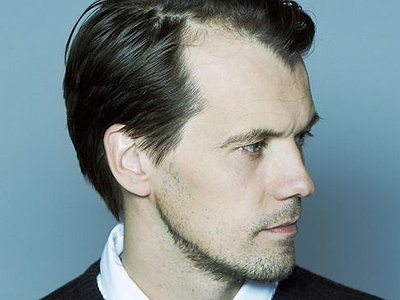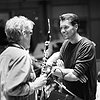Name: Kaada
Nationality: Norwegian
Occupation: Composer, Multi-Instrumentalist
Current Release: Diving into the Unknown (Soundtrack)
Musical Recommendations: In terms of film composers, and learning its craft, it’s definitely not a bad idea to get into what the masters have been doing: Danny Elfman, Jerry Goldsmith, Marc Shaimen, Ira Newborn, Hans Zimmer, Thomas Newman, Alan Menken, Patrick Doyle and John Williams all fall into that category.
Website: If you enjoyed this interview with Kaada, you can find more information about him on his website.
For most artists, originality is first preceded by a phase of learning and, often, emulating others. What was this like for you? How would you describe your own development as an artist and the transition towards your own voice?
I went through various phases of playing piano in different styles as a kid. I played in all sorts of bands, and I even played organ in church. I took lessons in Jazz and improvisations, as well as classical piano even though becoming a concert pianist was an unrealistic dream. I knew that I would never live up to the standards of my classical piano heroes. It was when I started to combine the worlds of improvisation and more classical traditions that things started to fall into place. But I kind of found my place by improvising and toying around with themes from Chopin, Liszt, Mozart and the rest of the gang. It probably didn’t sound like much in the start, but it was inspiring to do something that few others were doing.
Tonalities from the classical repertoire can still be heard in most of my compositions. I wouldn't know how to describe my own voice, or sound; I leave that to others. We all have to learn the basics and the techniques, but it's about how you do it in your own way that's interesting. It's about emotionally reaching a point where you, with confidence, translate some of your selves through your music.
Tell us about your studio, please. What were criteria when setting it up and how does this environment influence the creative process? How important, relatively speaking, are factors like mood, ergonomics, haptics and technology for you?
My workplace is a studio in Oslo called Wrongroom. It's where I have set up all my gear, and it's where I like to spend my days. There are a few recording spaces there with a few microphones set up and ready to go. A drum room, a keyboard room and a guitar room, in addition to a larger recording space where I record strings, plus two writing suites with lots of computer power and hardware. The last few years have been so hectic that I have had to hire an assistant to take care of the general maintenance of the place.
What are currently some of the most important tools and instruments you're using?
It comes down to Logic. The music is written and produced on computers. I have left ProTools for Logic because of the midi and samples capabilities. Plus that it is stable, ever growing and flexible. Mixing in Logic is a part of the composing process. I enjoy taking the different elements in the music, and bring them together in one harmonious sound. I have actually developed a bus system, which gets better for every production. I could go on and on about how I do it, but to put it simply, I mix down to nine stems with integrated effects, going through different soft- and hard-ware processors.
As opposed to many artists, I appreciate doing the technical stuff beside the composing. I love to make a perfect folder hierarchy, make project archives, sort my sample libraries, and to make my operating systems bug-free and up to date. I am not creative enough to make music all the time, so to take a day off here and there to polish the workflow in the studio is nice. A new synth, a new sample library or a new setting on an effect pedal can trigger inspiration, and joy.
In which way do certain production tools suggest certain approaches, in which way do they limit and/or expand your own creativity?
New Technology and faster machines doesn't necessary mean better music. Some of my best songs were made on computers that had less power than a cheap mobile phone of today. I'd still say that my macs and my sample libraries are my most important production tool. Although I love to work with musicians and orchestras, I am incorporating samples into the workflow all the time. It is easy to put too many sounds into the music nowadays, and oftentimes more isn't better, it's just more. A typical process for making a song would be recording way too many tracks, but muting most of them in mixing. It’s definitely healthy for creativity to put up some limits and to decide on a few instruments that you are allowed to use in a certain song.
Can you take me through your process of composing a soundtrack on the basis of a movie that's particularly dear to you, please? Where do ideas come from, what do you start with and how do you go about shaping these ideas?
The first step, and the most important step, probably throughout the whole process, is to listen, and listen very carefully. Communication is vital for a composer and the production they are hired for. Your personality and ability to work with others, both creatively and personally, have to be as effective as the notes you write. You have to listen to what the director and the people working on the film say, use your intuition, and understand their vision. They will have been on the script for a long time already, and their thoughts are valuable on many levels. If you can get a correct feel for what they want, their musical taste, and how far you can push the limits, you are well on your way.
You acknowledge all requests and directions, but then assimilate them into your own vision. Get it right and everything will fall into place, and you will be blessed with fewer revisions and rewrites later on.
One of the things I find inspiring in film composing, is that you often end up making music that you otherwise wouldn't be making. But whatever I make, I always seem to unconsciously bring some of my characteristics with me. Which is probably why I am often called upon when directors want to make something quirky or weird.
How do you see the relationship between image and sound in a movie? How directly are you working with the images in the writing process?
It's different every time. Sometimes I write and record a bunch of compositions in advance just based on the script. I write as many songs as I can and pick the best, and send them in. Other times I watch the picture, then I grab some string and bend it. If it doesn’t feel right, I move up a fret and try again. Usually it’s a combination of the two. It’s a lovely job.



